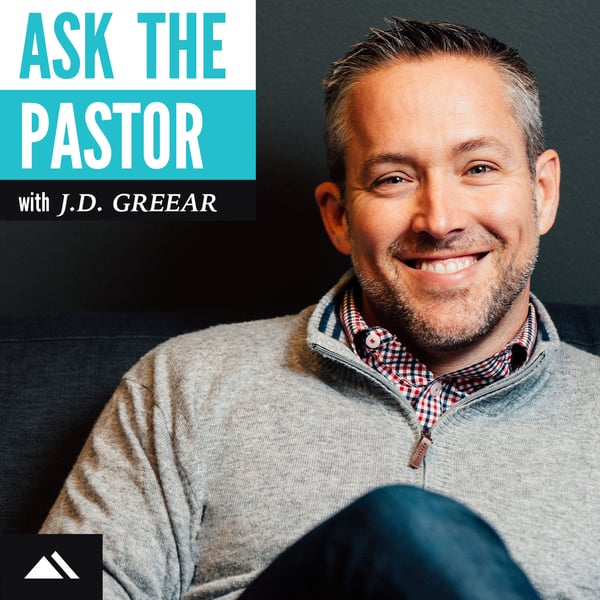How Should We Respond to a Police Shooting?
Ask the Pastor with J.D. Greear
J.D. Greear
4.9 • 624 Ratings
🗓️ 4 February 2019
⏱️ 13 minutes
🧾️ Download transcript
Summary
A glimpse inside this episode:
When we see the broad strokes of racism in our past, we cannot avoid seeing how racism has deeply impacted social realities like families, governments, and schools. Social realities are slow to change, and while laws are good, they cannot immediately overcome generations of unjust practices.We see this reality play out when news hits of a white police officer shooting and killing a person of color.
On one side, African Americans are keenly aware of racial injustice in our history, so they sense enough of a pattern to assume injustice in this particular case. This one incident calls to mind the long period of public lynchings and other instances of racial violence. This is a valid viewpoint.
On the other side, white commentators often respond by counseling patience. The historical realities may create a disturbing pattern, but it would be unjust to assume the guilt of any individual—white or black—without letting our justice system pursue the facts.
I asked Dr. George Yancey about these situations:
“What do you do in a moment like this? It seems we’re being asked to choose between two responses, both of which are bringing in strong (and seemingly contrary) assumptions. How do we speak in a way that communicates sympathy without subverting the justice system? I don’t want to commit one injustice (depriving the police officer the presumption of innocence and due processes of law) in order to rectify another.”
Dr. Yancey responded,
“You can always—and should always—come out quickly with sympathy for the victims. After all, it is a tragedy when anyone is shot and killed. But you can go further, lamenting the fact that we still live in a racialized society whose past makes questions like this even pertinent. It should be unthinkable that ethnicity plays a role in police shootings. But it’s not. And that’s a tragedy.”
Dr. Yancey is right. If, God forbid, my white son was shot by the police, I would never ask if his death had anything to do with his skin color.
My African American friends should have that same privilege.
It’s past time we quit thinking about this as a conservative or liberal issue. The dividing line on this issue is not between Conservatives and Liberals. The dividing line runs between those who care about the problem and those who don’t.
Transcript
Click on a timestamp to play from that location
| 0:00.0 | Lifeway Leadership Podcast Network. |
| 0:05.0 | You're listening to Ask Me Anything with Pastor J.D. Greer. |
| 0:09.2 | Honest questions, quick answers. |
| 0:11.3 | I'm your host, Todd Unzicker, and this is where J.D. Greer. |
| 0:34.6 | Honest questions, quick answers, where Pastor J.D. says, ask me anything, quick answers where Pastor J.D. says, |
| 0:38.3 | ask me anything. And he tackles today's toughest theological, ethical, and moral issues. |
| 0:44.5 | Pastor J.D., we're going to follow up. Last episode we asked about, is white privilege real? |
| 0:52.6 | Here a lot of questions started coming in was, |
| 0:55.0 | how should Christians respond to a police shooting? |
| 0:59.0 | Yeah, this is kind of where the rubber hits the road, |
| 1:01.0 | and I'll just give you a little context for how we experience that here at the church. |
| 1:05.0 | There's some really tragic event where somebody is shot in the middle of some kind of altercation by the police and they turn out to be |
| 1:13.5 | unarmed. And then there's all these questions about where they threatened the police officer |
| 1:18.1 | was or did that happen because police officers have a propensity to shoot black boys, |
| 1:25.3 | black men more quickly than they would somebody else. And the dilemma becomes, |
| 1:30.0 | because some of our brothers and sisters of color have helped me understand that it's hard to |
| 1:35.9 | separate this one particular incident from past incidents. And we do know if you go back in |
| 1:42.2 | history, especially in the Jim Crow era, and before that, |
| 1:44.5 | you've got, you know, police that definitely would. I mean, whether, you know, it's as extreme as |
| 1:48.5 | lynching or just, you know, hey, this is the color you are, so we're going to suspect these things |
| 1:52.8 | about you, that it's hard not to read that into this moment and say there's still this legacy of |
| 1:57.6 | a white privilege of the assumption of innocence, whereas if you're, you're black |
... |
Please login to see the full transcript.
Disclaimer: The podcast and artwork embedded on this page are from J.D. Greear, and are the property of its owner and not affiliated with or endorsed by Tapesearch.
Generated transcripts are the property of J.D. Greear and are distributed freely under the Fair Use doctrine. Transcripts generated by Tapesearch are not guaranteed to be accurate.
Copyright © Tapesearch 2025.

